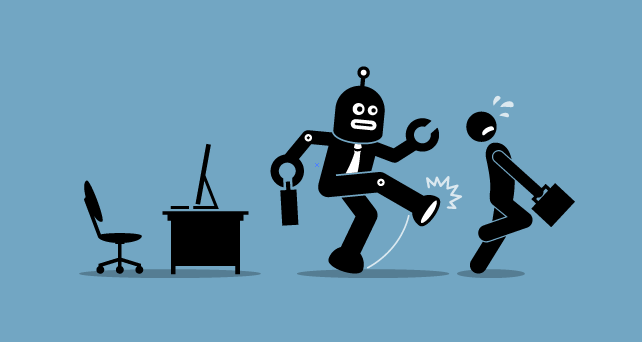Smart machines can already drive cars, diagnose patients, and manage finances more effectively than humans, leaving many fearing the future of work and how companies will compete within this.
A survey by the International Bar Association cemented some of the fears the general public may have of being replaced by machines in the near future. One in three graduate level jobs around the world may eventually be replaced by machines or software, according to the study, but industry experts believe this may prove to be the biggest opportunity for greater efficiency and bigger achievements for humanity in the years ahead.
The 120-page report looks at the legal implications of automation and robotics as these technologies enter the mainstream. The changes already transforming work are called ‘industrial revolution 4.0’, following the first revolution, industrialisation, then electrification and more recently digitalisation. Industry 4.0 is the current trend of automation and data exchange in manufacturing technologies, including cyber-physical systems, the internet of things and cloud computing.
Artificial intelligence is already starting to fuel a surge in productivity and in the next few years, AI will drive business and job growth for those who take the right steps today.
Building jobs and freeing up valuable time
Despite ongoing fears and speculation that robots could steal British jobs, separate research reveals that close to two in three industry professionals have never witnessed anything of the kind as a result of the introduction of automated processes. Over a third stated that robots have often resulted in job creation within their place of work.
The research was conducted amongst over 1,000 manufacturing professionals and was led by the Chartered Institute of Ergonomics and Human Factors (CIEHF) in collaboration with independent job site, CV-Library. The study sought to ascertain the true perception and reality of automation and robotics amongst those who experience it first-hand.
Key findings revealed that 72.6 per cent professionals feel society is scared into believing robotics and automation are bad developments, especially for job retention. However four in five manufacturers feel more should be done to promote the benefits of automation and robotics in the workplace. Almost half of industry professionals claim the business they work for does not communicate the benefits of automation to staff, particularly to those involved in first-hand production, which explains why 52 per cent of those surveyed admit that there is resistance from employees when implementing new automated processes.
“Robots and automation are regularly given a bad name. However, whilst automation might remove some mundane and repetitive jobs, it also makes a significant contribution to ‘upskilling’ employees, which is often overlooked,” says Steve Barraclough, CEO of the CIEHF.
“Automation requires programmers and maintainers in areas where they may not have been previously necessary. This presents a real opportunity to businesses and manufacturers that are embracing change. It’s essential to keep people at the heart of new technology and to ‘on-board’ staff at the earliest opportunity. Human factors plays a significant role in the on-boarding process and is essential to ensuring employees are not resistant to change.”
New technology will enhance more jobs than they replace, agree experts from global technology consultancy Cognizant’s Centre for the Future of Work. More than 80 per cent of teaching, nursing, legal, and coding jobs will be made more productive – and satisfying – as the most monotonous tasks are transferred to machines. The future is already here: early winners in our digital era are showing us a practical way to move ahead. Cognizant’s Malcolm Frank, Paul Roehrig, and Ben Pring are futurists and co-authors of What To Do When Machines Do Everything: How to Get Ahead in a World of AI, Algorithms, Bots and Big Data, in which they outline how the winners in the future of work will be those who harness the power of these new machines. These are some of their findings.
What machines mean for businesses and workers
Many may be thinking “aren’t we already well into the digital economy era?”. It is true that there are now countless apps and computing technologies that allow people to conveniently hail a cab, book a hotel, or clean floors with a robot, but the real boom is just beginning. In the years to come, AI will seep even further into how financial health is safeguarded, how families are insured, how people can heal and govern themselves – what Cognizant calls “digital that matters”. Systems of intelligence, which combine hardware, AI software, data, and human input to create value, will help improve countless customer experiences, business processes, products and organisations.
Jobs and businesses will undoubtedly be impacted. The debate on whether robots and AI will take over work is done. The next step is for informed pragmatists to take action to win in the Fourth Industrial Revolution.
Stagnant wages, rising debt levels, and anaemic productivity growth have led to headlines that seem to foretell a pending jobless nightmare of breadlines and robot overlords. Yet, within this malaise, there is good news. One of the most common concerns is that the bots will take over everything. It is true machines will replace some occupations and make some current skills irrelevant, but the analysis shows that as machines can do more and more of nearly everything, people will be even more vital to value creation.
The digital revolution is fundamentally a growth story. Machines are already beginning to enhance the human element of work and generate more jobs. For example, the future workforce will require more people to fill jobs currently in short supply: data scientists, designers, technologists, and strategists. Now is not the time to short human imagination. As they have in the past, the new machines will also create new jobs, and even professions, that do not yet exist.
The importance of mastering the three Ms
While the future of an automated workforce can be frightening, the AI revolution will create a huge wave of opportunity for businesses and individuals who are prepared. Typically, every previous revolution has followed such a pattern: innovation bubble, stall, and then boom. The Fourth Industrial Revolution will be no different. Early digital economy winners have aligned the Three Ms – materials, machines and models – to create value.
- Raw materials: Sensors now on nearly every “thing” – IoT devices, RFID sensors, accelerometers, motion sensors, etc. – create massive amounts of data that is the new raw material of the digital economy.
- New machines: Systems of intelligence “process” this new raw material data by combining hardware, AI software, algorithms and human input to improve productivity – and consumer delight – related to specific business processes and customer experiences.
- Business models: New commercial models are emerging that monetise services and solutions based on systems of intelligence. Without the right business model to support data-fuelled machines, companies will struggle to be successful.
Business leaders need to decide how to instrument everything, how to harvest all the resulting data, how to ask the right questions of the data, and to “teach” the AI systems what to look for, what is meaningful, and what is immaterial.
Five plays for winning with AI
Each of the Three Ms in today’s business success formula must be activated to move AHEAD. This model for leaders outlines five distinct approaches for not only winning with AI but surviving and thriving in this time of transition. Leaders can compete and win in the next phase of global business by driving productivity, customer intimacy, and innovation through:
- Automation: Outsource rote, computational work to the new machine. This is how Netflix automated away Blockbuster and how Uber is automating crowdsourced transportation.
- Halos: Instrument products and people and maximise the data (aka a “Code Halo”) they generate – via their connected and on-line behaviours – to create new customer experiences and business models. GE and Nike are instrumenting their products, surrounding them with halos of data, and creating new value propositions with improved customer intimacy.
- Enhancement: View the computer as a colleague that can help increase job productivity and satisfaction. For example, a car’s GPS system improves truck driver performance by enhancing navigation, providing alerts for road hazards, and ensuring the fastest route is taken on any given journey.
- Abundance: Use the machine to open up vast new markets by dropping the price-point of existing offers. For example, Betterment is using AI to bring financial security to the masses by providing highly personalised, curated wealth management services 24×7.
- Discovery: Maximise use of AI to conceive new products, new services, and new industries. Just as Edison’s light bulb led to discoveries in radio, television, and transistors, today’s new machines will lead to the next generation of invention.
The world is changing faster than ever before. Automation and the rise of AI are truly deep and unstoppable forces – they are the core of this incredible pace of change. The shift to the new machine and AI is inevitable but if managed wisely, according to experts, it will ultimately be a positive force for companies, individuals, and society.






